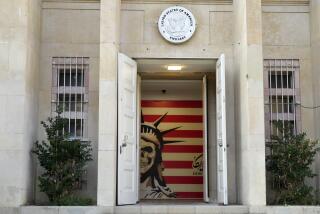Iran’s president urges Americans to back Iraq exit
- Share via
UNITED NATIONS — Iran’s president appealed directly to the “God-fearing, peace-loving and justice-seeking” American people in an open letter released Wednesday, saying that the U.S. should leave Iraq and spend the billions of dollars meant for war on the welfare of Americans instead.
President Mahmoud Ahmadinejad wrote that Iranians and Americans shared common values to protect freedom and human dignity, and said that “hundreds of thousands of my Iranian compatriots are living among you in friendship and peace.”
He also urged support for the creation of a Palestinian homeland, portraying U.S. backing for Israel as the key difference that alienates the U.S. from much of the Middle East.
Though he did not repeat earlier denials of the Holocaust or calls to wipe Israel “off the map,” the Iranian president denounced the Bush administration’s “blind support” for “Zionists,” who he claimed “have imposed themselves on a substantial portion of the banking, financial, cultural and media sectors.”
The letter echoed President Bush’s address to the U.N. General Assembly in September, in which Bush ignored the Iranian leadership and spoke directly to the Iranian people about their struggle for democracy.
Perhaps emboldened by Iran’s rising influence in Iraq and the U.N. Security Council’s lack of action against his nation’s nuclear program, Ahmadinejad struck a self-assured tone that was slightly more moderate than the scolding 18-page epistle he sent Bush in May. He said Wednesday that since the U.S. military presence in Iraq began in 2003, terrorism there had grown exponentially and the pain and suffering of the Iraqi people was worse than under former President Saddam Hussein.
The Bush administration dismissed the latest letter as a “public relations stunt.”
Shibley Telhami, a senior fellow of the Brookings Institution in Washington, said that the letter “shows that Ahmadinejad closely follows American politics, and may be anticipating recommendations by the Iraq Study Group to engage with Iran.”
“But it also displays his naivete that the American public shares his world view. It is likely that much of his audience is outside the U.S., in the Arabic, Muslim world, and that it does increase and improve his standing by showing he can stand up to the United States,” Telhami said.
Aside from Koranic quotations and anti-Semitic sentiments, Ahmadinejad sounded more like a Democrat on the campaign trail than a leader of a government the U.S. has in its sights. He accused the Bush administration of arbitrarily detaining inmates at prisons at Abu Ghraib near Baghdad and at Guantanamo Bay, Cuba.
Seizing on the Republican Party’s defeat in the congressional election, he applauded Americans for repudiating the Bush administration’s policies and pushed Democrats to restore the legitimacy and influence he believes the U.S. has lost.
“Undoubtedly, the American people are not satisfied with this behavior, and they showed their discontent in the recent elections. I hope that in the wake of the midterm elections, the administration of President Bush will have heard and will heed the message of the American people,” the Iranian president said.
Ahmadinejad did not address the standoff over Iran’s nuclear program, perhaps in recognition that the prospect of Security Council sanctions was faltering. Iran has ignored the council’s Aug. 31 deadline to halt the enrichment of uranium, a process that could be used either in the production of fuel or nuclear weapons, or face sanctions. But Tuesday, a new draft resolution circulated among council members that did not even mention penalties because of objections by Russia and China.
Karim Sadjapour, an Iran analyst with the International Crisis Group, said that he doubted that Ahmadinejad’s letter would have much effect on Americans’ view of Iran.
“He hasn’t furthered Iran’s cause. He may have undermined it,” he said. “He is trying to appeal to the people and the media, but Iran is the largest prison for journalists in the Middle East. “For him to be writing that from Iran rings a bit hollow.”
*
More to Read
Sign up for Essential California
The most important California stories and recommendations in your inbox every morning.
You may occasionally receive promotional content from the Los Angeles Times.










